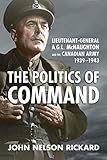Politics of Command : Lieutenant-General A.G.L. McNaughton and the Canadian Army, 1939–1943 / John Nelson Rickard.
Material type: TextPublisher: Toronto : University of Toronto Press, [2010]Copyright date: ©2010Description: 1 online resource (416 p.) : 18 b&w illustrationsContent type:
TextPublisher: Toronto : University of Toronto Press, [2010]Copyright date: ©2010Description: 1 online resource (416 p.) : 18 b&w illustrationsContent type: - 9781442640023
- 9781442686427
- Command of troops
- Generals -- Canada -- Biography
- World War, 1939-1945 -- Canada -- Biography
- BIOGRAPHY & AUTOBIOGRAPHY / Military
- Bernard Paget
- Canadian Armed Forces
- Canadian Army
- Canadian military history
- Exercise SPARTAN
- Harry Crerar
- Lieutenant-General A.G.L. McNaughton
- Second World War
- Sir Alan F. Brooke
- WWII
- 940.54/1271092
- U55.M345 R53 2010eb
- online - DeGruyter
| Item type | Current library | Call number | URL | Status | Notes | Barcode | |
|---|---|---|---|---|---|---|---|
 eBook
eBook
|
Biblioteca "Angelicum" Pont. Univ. S.Tommaso d'Aquino Nuvola online | online - DeGruyter (Browse shelf(Opens below)) | Online access | Not for loan (Accesso limitato) | Accesso per gli utenti autorizzati / Access for authorized users | (dgr)9781442686427 |
Browsing Biblioteca "Angelicum" Pont. Univ. S.Tommaso d'Aquino shelves, Shelving location: Nuvola online Close shelf browser (Hides shelf browser)

|

|

|

|

|

|

|
||
| online - DeGruyter The German Forest : Nature, Identity, and the Contestation of a National Symbol, 1871-1914 / | online - DeGruyter Enchanted Objects : Visual Art in Contemporary Fiction / | online - DeGruyter Education and Jobs : Exploring the Gaps / | online - DeGruyter Politics of Command : Lieutenant-General A.G.L. McNaughton and the Canadian Army, 1939–1943 / | online - DeGruyter Media, Structures, and Power : The Robert E. Babe Collection / | online - DeGruyter The Space of the Book : Print Culture in the Russian Social Imagination / | online - DeGruyter Editors, Scholars, and the Social Text / |
Frontmatter -- Contents -- Maps -- Tables and Figures -- Foreword -- Preface -- Acknowledgments -- Abbreviations -- Introduction -- Part One: The Making of Andy McNaughton -- 1. Early Life and the Crucible of the First World War -- 2. The Road to High Command -- Part Two: The Problem of Deploying the Army -- 3. A Willingness to Fight, 1940–1941 -- 4. From ROUNDUP to TORCH -- 5. Practical Operations of War -- Part Three: McNaughton as Military Commander and Trainer -- 6. The Difficulty of Training in 1940 -- 7. The Politics of Training -- 8. Enter Montgomery -- 9. Exercise SPARTAN -- 10. The Long Shadow of SPARTAN -- Part Four: The End of an Idea -- 11. The Sicily Incident -- 12. Broken Dagger: A Corps in Italy -- 13. The Final Months of McNaughton’s Command -- Epilogue -- Conclusion -- Appendices -- Notes -- Bibliography -- Index
restricted access online access with authorization star
http://purl.org/coar/access_right/c_16ec
In December 1943, Lieutenant-General A.G.L. McNaughton resigned from command of the 1st Canadian Army amidst criticism of his poor generalship and of his abrasive personality. Despite McNaughton's importance to the Canadian Army during the first four years of the Second World War, little has been written about the man himself or the circumstances of his resignation.In The Politics of Command, the first full-length study of the subject since 1969, John Nelson Rickard analyzes McNaughton's performance during exercise SPARTAN in March 1943 and assesses his relationships with key figures such as Sir Alan F. Brooke, Bernard Paget, and Harry Crerar. This detailed re-examination of McNaughton's command argues that the long-accepted reasons for his relief of duty require extensive modification.Based on a wide range of sources, The Politics of Command will redefine how military historians and all Canadians look not only at ";Andy"; McNaughton, but the Canadian Army as well.
Mode of access: Internet via World Wide Web.
In English.
Description based on online resource; title from PDF title page (publisher's Web site, viewed 01. Dez 2023)


